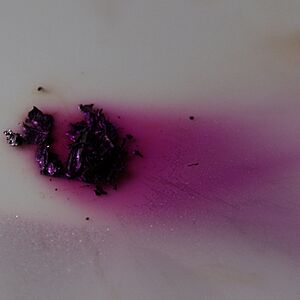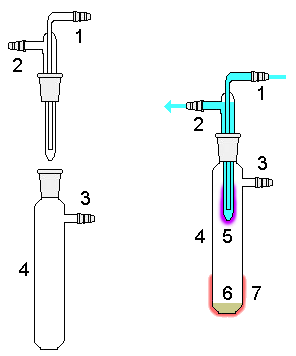Sublimation facts for kids

Sublimation is a cool science trick where a solid material turns directly into a gas. It completely skips the liquid stage! Imagine an ice cube turning straight into water vapor without ever melting into water. That's sublimation!
This happens when the tiny pieces (particles) of a solid get enough energy. They break free from each other and float away as a gas. For most things to sublime, there needs to be very low air pressure around them. This is why it happens easily in outer space!
Contents
What is Sublimation?
Sublimation is a special change of state. Normally, when you heat a solid, it melts into a liquid. Then, if you heat the liquid more, it turns into a gas. Sublimation skips the liquid step entirely. The solid goes straight to being a gas.
How Does It Work?
Everything is made of tiny particles. In a solid, these particles are packed tightly together. They vibrate in place. When a solid gets enough energy, these particles start moving faster. If they get enough energy, they can break away from each other completely. Instead of becoming a runny liquid, they fly off as a gas. This usually needs very specific conditions, like low air pressure.
Sublimation in Everyday Life
You might have seen snow seem to disappear on a cold, sunny winter day. This can sometimes be sublimation. It happens when the air is very dry. The snow turns directly into water vapor without melting first. However, if the snow melts into a thin layer of water before disappearing, that's not sublimation.
Common Examples of Sublimation
On Earth, at normal air pressure, only a few things commonly sublime. The most famous example is dry ice. Dry ice is solid carbon dioxide (CO2). When you see dry ice smoking, it's actually turning directly into carbon dioxide gas. It never melts into a liquid.
Other materials that can sublime at normal air pressure include:
- Iodine: This is a chemical element. You can see it turn from a purplish solid into a purple gas.
- Ammonium chloride: This is a white solid often used in chemistry labs.
- Aluminium chloride: Another chemical compound that can sublime.
- Diamond and graphite: These are both forms of carbon. They can also sublime instead of melting, but this requires extremely high temperatures.
See also
 In Spanish: Sublimación (desambiguación) para niños
In Spanish: Sublimación (desambiguación) para niños
 | Audre Lorde |
 | John Berry Meachum |
 | Ferdinand Lee Barnett |


